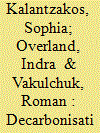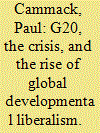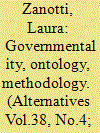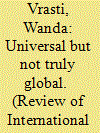|
|
|
Sort Order |
|
|
|
Items / Page
|
|
|
|
|
|
|
| Srl | Item |
| 1 |
ID:
191010


|
|
|
|
|
| Summary/Abstract |
The race to rapidly decarbonise and digitalise the global economy by 2030 to avoid temperatures rising above 1.5C has been subsumed by geopolitics that remains anchored in realist power struggles, now revolving around Sino-American hyper-competition. The Russian invasion of Ukraine further undermined interdependence and prompted unprecedented levels of economic statecraft. Access to indispensable minerals for a net zero future has thus become more securitised. The European Union (EU) has pushed back against bipolar geopolitics by utilising its normative, economic and regulatory power and strong networks of global institutional relations to maintain a competitive but working relationship with the People’s Republic of China (PRC). Such an approach may help broker broader global institutional collaboration to ensure that decarbonisation is for all, not just for the few.
|
|
|
|
|
|
|
|
|
|
|
|
|
|
|
|
| 2 |
ID:
110103


|
|
|
|
|
| Publication |
2012.
|
| Summary/Abstract |
The emergence of the G20 leaders' meeting during the recent global financial crisis as the 'premier forum for international economic cooperation' reflects a significant shift of hegemony over global governance towards the emerging economies but does not challenge the authority or objectives of the international financial institutions. On the contrary, successive G20 initiatives, culminating in the adoption of the Seoul Development Consensus for Shared Growth in November 2010, reveal both a further strengthening of the already close institutional relationship between the G20 and the Bretton Woods institutions and a strong shared commitment to a developmental form of global liberalism. This article charts the ascendancy of emerging economy perspectives through the lens of the G20, maps their ties to the imf and other international organisations, sets out the content of the new global developmental liberalism, and assesses the implications of emerging economy hegemony for the advanced and the emerging economies, respectively.
|
|
|
|
|
|
|
|
|
|
|
|
|
|
|
|
| 3 |
ID:
129484


|
|
|
|
|
| Publication |
2013.
|
| Summary/Abstract |
Some critical international relations scholars have adopted theories of governmentality both as a heuristic framework for exploring modalities and functions of power and as a descriptive tool to explore the oppressive effects of global liberalism. I argue that, as a descriptive tool, much governmentality literature remains rooted in the same substantialist ontology and epistemology as the liberal discourses it seeks to criticize. This ontological orientation especially has a bearing on conceptualizations of political agency, which remain confined to the liberal struggle of power and freedom. I suggest that reimagining political agency calls for a reorganization of the ontological and epistemological framework of international relations in non-substantialist ways. The analysis maps non-substantialist positions across disciplinary lines. By treating power and subjects as deeply imbricated, non-substantialist ontologies examine political engagements as processes of hybridization aimed at producing practical effects in specific contexts.
|
|
|
|
|
|
|
|
|
|
|
|
|
|
|
|
| 4 |
ID:
118953


|
|
|
|
|
| Publication |
2013.
|
| Summary/Abstract |
This article responds to issues raised about global governmentality studies by Jan Selby, Jonathan Joseph, and David Chandler, especially regarding the implications of 'scaling up' a concept originally designed to describe the politics of advanced liberal societies to the international realm. In response to these charges, I argue that critics have failed to take full stock of Foucault's contribution to the study of global liberalism, which owes more to economic than political liberalism. Taking Foucault's economic liberalism seriously, that is, shifting the focus from questions of natural rights, legitimate rule, and territorial security to matters of government, population management, and human betterment reveals how liberalism operates as a universal, albeit not yet global, measure of truth, best illustrated by the workings of global capital. While a lot more translation work (both empirical and conceptual) is needed before governmentality can be convincingly extended to global politics, Foucauldian approaches promise to add a historically rich and empirically grounded dimension to IR scholarship that should not be hampered by disciplinary admonitions.
|
|
|
|
|
|
|
|
|
|
|
|
|
|
|
|
|
|
|
|
|